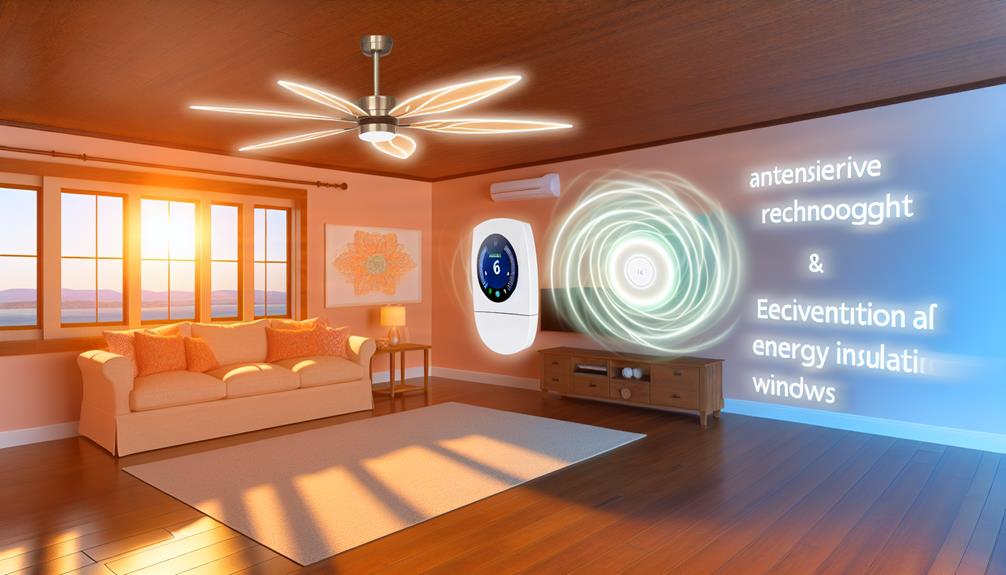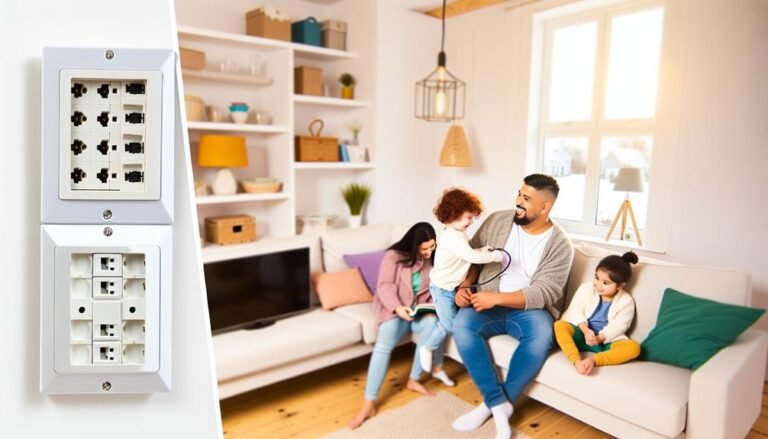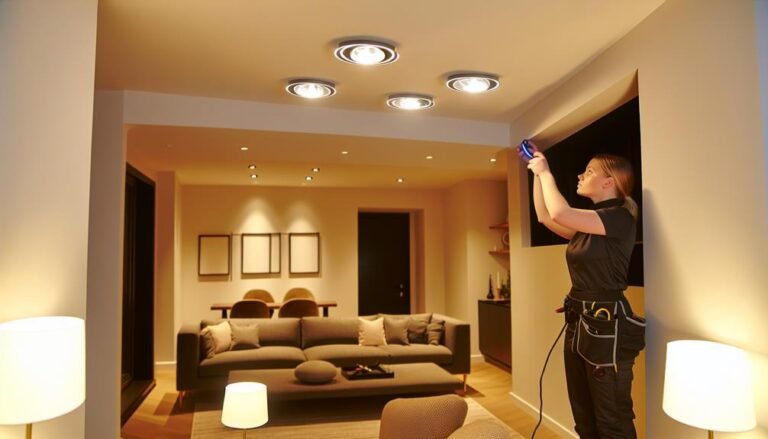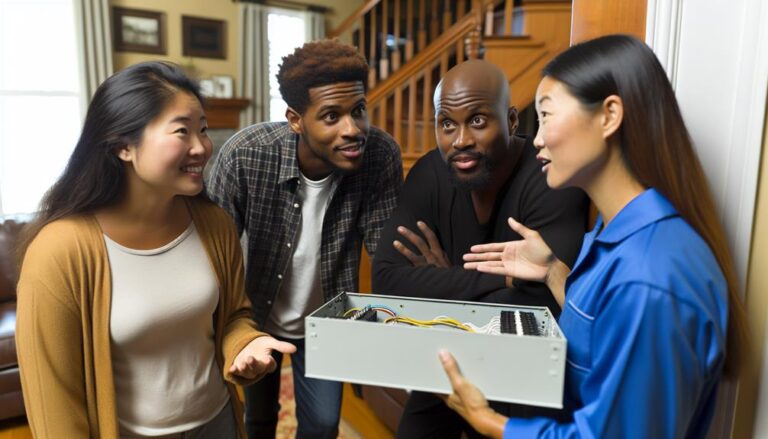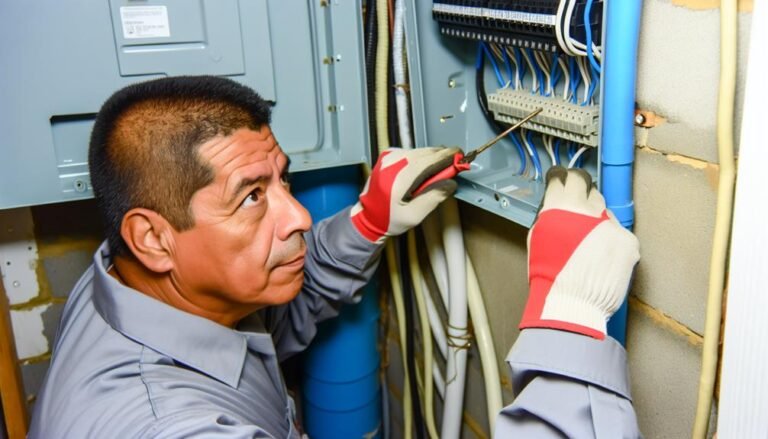Energy-Saving Tips From Expert Residential Electricians
Looking to lighten your energy bills while helping the environment? Let expert residential electricians shed some light on energy-saving tips that are both effective and efficient.
From optimizing your lighting efficiency to managing appliance power, these professionals have got you covered.
But that’s not all! They’ll also share insights on smart thermostat usage, insulation and weatherization, as well as energy-efficient HVAC systems.
So, if you’re eager to discover practical ways to reduce your energy consumption and save some hard-earned cash, read on to uncover these expert tips and start making a positive impact today.
Key Takeaways
- Switch to energy-efficient LED bulbs and utilize natural light to reduce energy consumption and save money on lighting.
- Unplug idle appliances, use power strips, and opt for energy-efficient appliances to manage power consumption and reduce standby power.
- Use a smart thermostat to set a schedule, lower temperatures when away or asleep, and take advantage of features like geofencing to optimize energy usage.
- Insulate your home, seal gaps and cracks, and install storm windows and doors to improve energy efficiency and keep your home comfortable.
Lighting Efficiency
To maximize energy savings in your home, follow these practical tips for improving lighting efficiency.
Start by replacing your traditional incandescent light bulbs with energy-efficient LED bulbs. LED bulbs consume significantly less energy and have a longer lifespan, making them a cost-effective choice for lighting your home.
Additionally, consider installing dimmer switches to adjust the brightness of your lights according to your needs. This not only saves energy but also allows you to create the desired ambiance in each room.
Another way to improve lighting efficiency is by utilizing natural light whenever possible. Open your curtains or blinds during the day to let sunlight illuminate your home. Not only does this reduce the need for artificial lighting, but it also has a positive effect on your mood and well-being.
When natural light isn’t sufficient, opt for task lighting instead of lighting up the entire room. This ensures that you have sufficient light for your activities without wasting energy on unnecessary illumination.
Lastly, make it a habit to turn off lights when you leave a room. Many people tend to forget this simple step, resulting in unnecessary energy consumption.
Appliance Power Management
Maximize energy savings in your home by effectively managing the power usage of your appliances. By implementing these simple strategies, you can reduce your energy consumption and lower your electricity bills.
- Unplug idle appliances: Many appliances continue to draw power even when they aren’t in use. Unplug devices like chargers, coffee makers, and gaming consoles when they aren’t being actively used to avoid unnecessary energy consumption.
- Utilize power strips: Plug multiple appliances into a power strip and turn it off when not in use. This will prevent standby power and save energy. Additionally, using smart power strips with built-in timers or motion sensors can further optimize energy usage.
- Opt for energy-efficient appliances: When purchasing new appliances, look for energy-efficient models with the ENERGY STAR label. These appliances are designed to consume less energy, saving you money in the long run.
Smart Thermostat Usage
When it comes to effectively managing your home’s energy usage, one area to focus on is smart thermostat usage.
Smart thermostats are devices that allow you to control the temperature of your home remotely through your smartphone or computer. By using a smart thermostat, you can easily adjust the temperature settings to optimize energy consumption and save money on your utility bills.
To make the most of your smart thermostat, start by setting a schedule that aligns with your daily routine. For example, you can program the thermostat to lower the temperature when you’re away from home or asleep, and raise it when you’re back or awake. This way, you can ensure that you’re not wasting energy heating or cooling an empty house.
In addition, take advantage of the energy-saving features offered by your smart thermostat. Many models have features like geofencing, which uses your smartphone’s location to adjust the temperature based on whether you’re at home or not. Others have learning capabilities that adapt to your habits over time, saving energy without you having to lift a finger.
Remember to regularly update your smart thermostat’s software to ensure it’s running efficiently and taking advantage of the latest energy-saving features.
Insulation and Weatherization
One effective way to improve your home’s energy efficiency and save on utility bills is by focusing on insulation and weatherization. By properly insulating your home, you can prevent the escape of warm or cool air, keeping your home comfortable and reducing the need for excessive heating or cooling.
Weatherization, on the other hand, involves sealing any air leaks in your home’s exterior to prevent drafts and heat loss.
Here are three simple yet effective ways to enhance insulation and weatherization in your home:
- Insulate your attic: Adding insulation to your attic can significantly reduce heat loss and prevent warm air from escaping. Consider using materials like fiberglass or cellulose insulation to achieve optimal results.
- Seal gaps and cracks: Inspect your home for any gaps or cracks around windows, doors, and electrical outlets. Seal these areas with weatherstripping or caulking to prevent air leaks and improve energy efficiency.
- Install storm windows and doors: Storm windows and doors provide an extra layer of insulation, reducing heat transfer and improving energy efficiency. They can also protect your home from harsh weather conditions.
Energy-Efficient HVAC Systems
To further improve your home’s energy efficiency, let’s now focus on energy-efficient HVAC systems, which can have a significant impact on your utility bills.
HVAC (Heating, Ventilation, and Air Conditioning) systems are responsible for a large portion of your home’s energy consumption. By upgrading to an energy-efficient HVAC system, you can reduce your energy usage and save money in the long run.
One key component of an energy-efficient HVAC system is the SEER rating (Seasonal Energy Efficiency Ratio). The higher the SEER rating, the more energy efficient the system is. Look for a system with a SEER rating of at least 14, as this is the current minimum standard. However, if you want to maximize energy savings, consider opting for a system with a SEER rating of 16 or higher.
Another important feature to consider is variable-speed technology. Traditional HVAC systems operate at a fixed speed, which can lead to energy waste. A system with variable-speed technology adjusts its speed based on the heating or cooling needs of your home, resulting in greater energy efficiency.
Proper sizing of your HVAC system is crucial as well. An oversized system will cycle on and off frequently, wasting energy, while an undersized system will struggle to maintain a comfortable temperature. Consult with a professional to ensure your system is sized correctly for your home.
Regular maintenance is also essential for energy efficiency. Schedule annual inspections and cleanings to keep your system running smoothly and efficiently.
© 2025 By Electrician Phoenix

